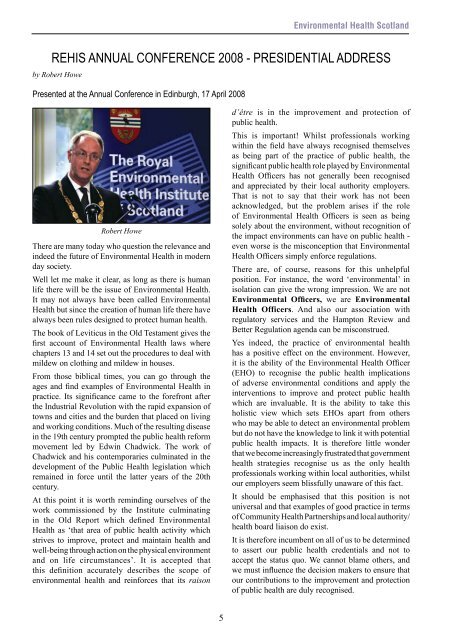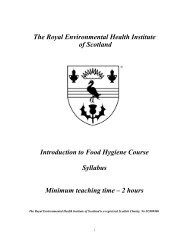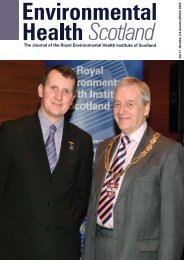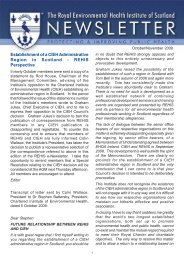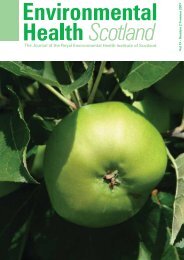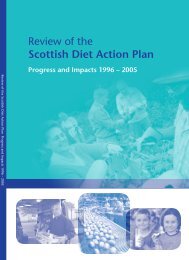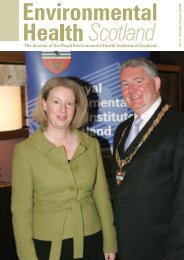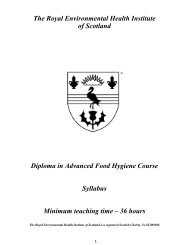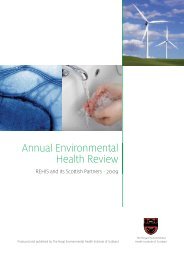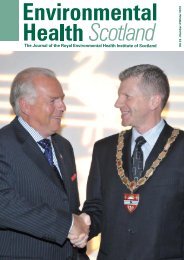Download REHIS Journal 20/2 (Summer 2008) - The Royal ...
Download REHIS Journal 20/2 (Summer 2008) - The Royal ...
Download REHIS Journal 20/2 (Summer 2008) - The Royal ...
You also want an ePaper? Increase the reach of your titles
YUMPU automatically turns print PDFs into web optimized ePapers that Google loves.
Environmental Health Scotland<strong>REHIS</strong> ANNUal conference <strong>20</strong>08 - presidential addressby Robert HowePresented at the Annual Conference in Edinburgh, 17 April <strong>20</strong>08Robert Howe<strong>The</strong>re are many today who question the relevance andindeed the future of Environmental Health in modernday society.Well let me make it clear, as long as there is humanlife there will be the issue of Environmental Health.It may not always have been called EnvironmentalHealth but since the creation of human life there havealways been rules designed to protect human health.<strong>The</strong> book of Leviticus in the Old Testament gives thefirst account of Environmental Health laws wherechapters 13 and 14 set out the procedures to deal withmildew on clothing and mildew in houses.From those biblical times, you can go through theages and find examples of Environmental Health inpractice. Its significance came to the forefront afterthe Industrial Revolution with the rapid expansion oftowns and cities and the burden that placed on livingand working conditions. Much of the resulting diseasein the 19th century prompted the public health reformmovement led by Edwin Chadwick. <strong>The</strong> work ofChadwick and his contemporaries culminated in thedevelopment of the Public Health legislation whichremained in force until the latter years of the <strong>20</strong>thcentury.At this point it is worth reminding ourselves of thework commissioned by the Institute culminatingin the Old Report which defined EnvironmentalHealth as ‘that area of public health activity whichstrives to improve, protect and maintain health andwell-being through action on the physical environmentand on life circumstances’. It is accepted thatthis definition accurately describes the scope ofenvironmental health and reinforces that its raisond’être is in the improvement and protection ofpublic health.This is important! Whilst professionals workingwithin the field have always recognised themselvesas being part of the practice of public health, thesignificant public health role played by EnvironmentalHealth Officers has not generally been recognisedand appreciated by their local authority employers.That is not to say that their work has not beenacknowledged, but the problem arises if the roleof Environmental Health Officers is seen as beingsolely about the environment, without recognition ofthe impact environments can have on public health -even worse is the misconception that EnvironmentalHealth Officers simply enforce regulations.<strong>The</strong>re are, of course, reasons for this unhelpfulposition. For instance, the word ‘environmental’ inisolation can give the wrong impression. We are notEnvironmental Officers, we are EnvironmentalHealth Officers. And also our association withregulatory services and the Hampton Review andBetter Regulation agenda can be misconstrued.Yes indeed, the practice of environmental healthhas a positive effect on the environment. However,it is the ability of the Environmental Health Officer(EHO) to recognise the public health implicationsof adverse environmental conditions and apply theinterventions to improve and protect public healthwhich are invaluable. It is the ability to take thisholistic view which sets EHOs apart from otherswho may be able to detect an environmental problembut do not have the knowledge to link it with potentialpublic health impacts. It is therefore little wonderthat we become increasingly frustrated that governmenthealth strategies recognise us as the only healthprofessionals working within local authorities, whilstour employers seem blissfully unaware of this fact.It should be emphasised that this position is notuniversal and that examples of good practice in termsof Community Health Partnerships and local authority/health board liaison do exist.It is therefore incumbent on all of us to be determinedto assert our public health credentials and not toaccept the status quo. We cannot blame others, andwe must influence the decision makers to ensure thatour contributions to the improvement and protectionof public health are duly recognised.


